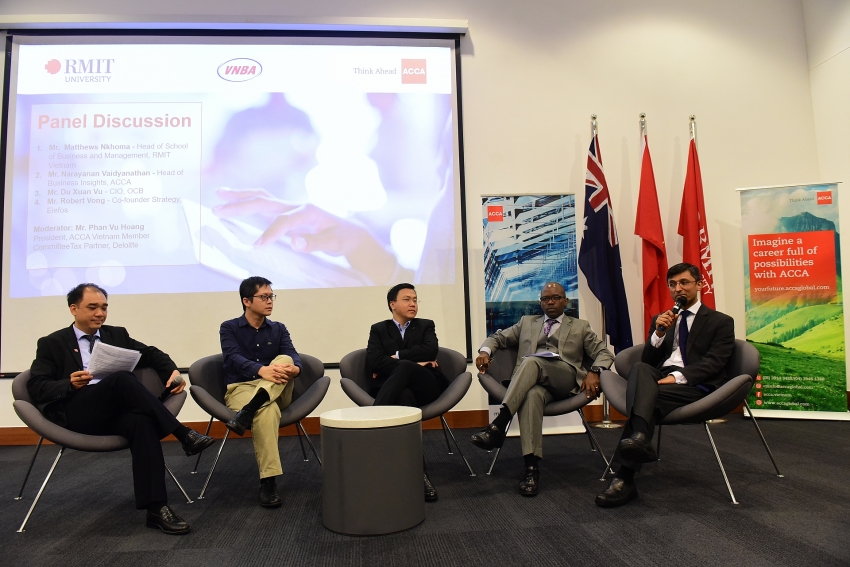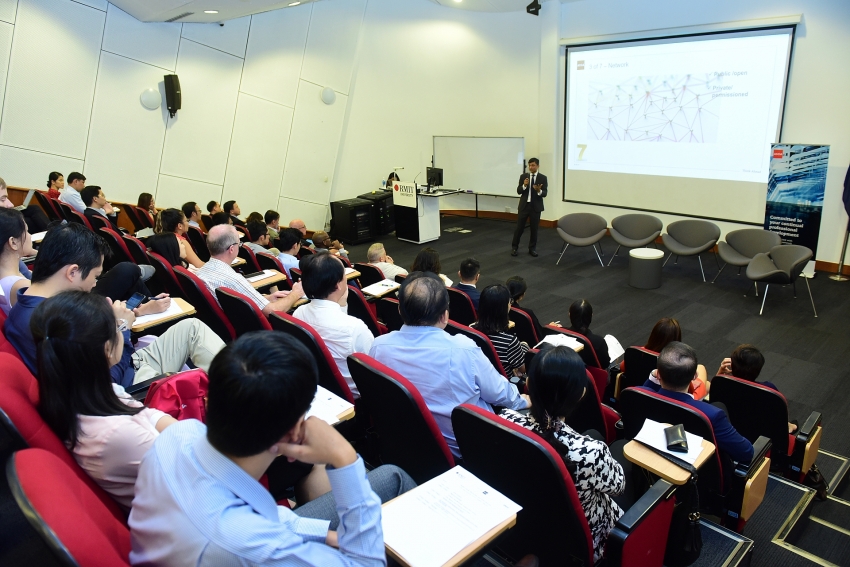Blockchain and cybersecurity adapting to changing landscape
 |
| Panel discussion about blockchain at the conference |
Besides impacting nearly all aspects of everyday life, new technologies are also changing and disrupting the financial industry and the way consumers and firms access financial services.
However, while technological innovation in finance is nothing new, investment in technology and the pace of innovation has increased significantly in recent years.
These include a wide array of developments ranging from social networks, artificial intelligence, machine learning, mobile applications, distributed ledger technology (DLT), cloud computing or big data analytics.
However, a substantial amount of uncertainty and confusion remains. Blockchain, for instance, is a topic that inspires equal parts fear and excitement. The conference, named Digital Trends: Blockchain & Cybersecurity aimed to shine an informed light on the latest development on blockchain as well as risks and opportunities of cybersecurity.
The debate confirmed that despite many challenges and risks to be addressed – such as fraud, market manipulation, and money laundering – crypto assets, Initial Coin Offering (ICO), and blockchain will play a key role in the future.
Narayanan Vaidyanathan, head of Business Insights at ACCA, said, "Blockchain technology allows users to develop applications that can run within decentralised economic systems in a way that was never thought possible before, but the technology is still at a very early stage. A key challenge will be to strike the right balance. While it is vital to create a supportive environment to enable innovation – and not hamper it – and to encourage job creation, threats to citizens, investors or unsophisticated consumers, as well as to financial stability have to be taken seriously. That is not an easy task, bearing in mind that cryptocurrencies do not know any borders."
"It is also important to avoid blaming the house for the fault of the people living in it. The underlying Distributed Ledger technology behind Bitcoin could revolutionise how financial transactions are done and have a positive impact on business globally. This potential must be viewed separately from the risks of Bitcoin,” he added.
 |
| Narayanan Vaidyanathan, head of Business Insights, ACCA, sharing the findings of ACCA's recent report |
Associate Professor Mathews Nkhoma, head of the School of Business & Management, RMIT Vietnam, added, “Rapidly growing connectivity and an accelerating pace of digital transformation make Asia – and particularly Vietnam – vulnerable to cyber exploitation."
"In a report conducted by Marsh & McLennan Companies in 2017 about cyber risk in the Asia-Pacific, Asian organisations take 1.7 times longer than the global median to discover a breach and 78 per cent of internet users in Asia have not received any education on cybersecurity.”
He emphasised that Vietnam was in the top ten countries targeted by attacks from 2015 to 2017, and in 2017 lost $542.8 million to cyber attacks.
There was a consensus among speakers that a balanced approach is needed, to understand the economic functions of innovations and the risks and benefits that they may bring. The debate also revealed the urgent need to invest in the skills of people in companies and universities, as with fintech, financial knowledge is interdependent with IT competencies.
Finance professionals and professional accountants will need to adapt to this fast-moving landscape and maintain an up-to-date understanding of developments to be able to guide their clients and organisations who are seeking funding.
Nguyen Thuy Minh Chau, head of ACCA's Mekong region, shared: “As the world’s most forward-thinking professional accountancy body, ACCA’s approach is to look ahead and engage pro-actively with key trends that could shape tomorrow’s profession world. Digital is arguably the biggest factor shaping the future of the profession and the future roles our students and members will perform."
"In 2016-2017, in the research Professional accountants – The Future, we identified digital as one of our seven professional quotients for success. Thanks to our various ground-breaking researches on digital technology such as Emotional Quotient in Digital Age, Ethics in the Digital Age and most recently Machine Learning: More Science than Fiction, we deliver the relevant digital skills that our students and members need by firmly embedding our findings throughout the ACCA Qualification and CPD resources. We are delighted to complement the work of others like our partner, RMIT, who is also striving to improve awareness of technology across our profession."
"This year, a series of events on Technology & Digital Transformation will be in place as the platform for insights discussion, skills and knowledge updated for our members and partners to be ready for tomorrow’s world,” she added.
What the stars mean:
★ Poor ★ ★ Promising ★★★ Good ★★★★ Very good ★★★★★ Exceptional
Related Contents
Latest News
More News
- VinaCapital launches Vietnam's first two strategic-beta ETFs (February 26, 2026 | 09:00)
- PM sets five key tasks to accelerate sci-tech development (February 26, 2026 | 08:00)
- PM outlines new tasks for healthcare sector (February 25, 2026 | 16:00)
- Citi report finds global trade transformed by tariffs and AI (February 25, 2026 | 10:49)
- Vietnam sets ambitious dairy growth targets (February 24, 2026 | 18:00)
- Vietnam, New Zealand seek level-up in ties (February 19, 2026 | 18:06)
- Untapped potential in relations with Indonesia (February 19, 2026 | 17:56)
- German strengths match Vietnamese aspirations (February 19, 2026 | 17:40)
- Vietnam’s pivotal year for advancing sustainability (February 19, 2026 | 08:44)
- Strengthening the core role of industry and trade (February 19, 2026 | 08:35)

 Tag:
Tag:























 Mobile Version
Mobile Version